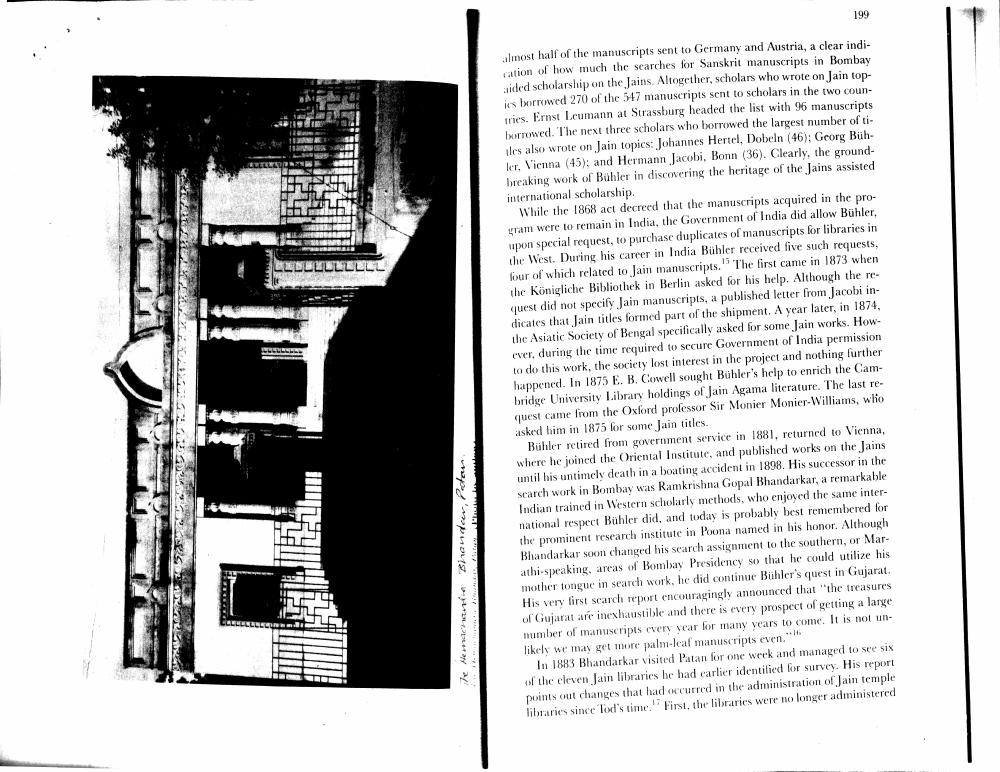________________
199
EL LLLLLLLL
MORETETTEKTET
almost half of the manuscripts sent to Germany and Austria, a clear indication of how much the searches for Sanskrit manuscripts in Bombay zuided scholarship on the Jains. Altogether, scholars who wrote on Jain topis borrowed 270 of the 547 manuscripts sent to scholars in the two counTries. Ernst Leumann at Strassburg headed the list with 96 manuscripts borrowed. The next three scholars who borrowed the largest number of tiiles also wrote on Jain topics: Johannes Hertel, Dobeln (46): Georg Bühler, Vienna (45): and Hermann Jacobi, Bonn (36). Clearly, the groundbreaking work of Bühler in discovering the heritage of the Jains assisted international scholarship
While the 1868 act decreed that the manuscripts acquired in the program were to remain in India, the Government of India did allow Bühler, upon special request, to purchase duplicates of manuscripts for libraries in the West. During his career in India Bühler received five such requests, four of which related to Jain manuscripts. The first came in 1873 when the Königliche Bibliothek in Berlin asked for his help. Although the request did not specify Jain manuscripts, a published letter from Jacobi indicates that Jain titles formed part of the shipment. A year later, in 1874, the Asiatic Society of Bengal specifically asked for some Jain works. However, during the time required to secure Government of India permission to do this work, the society lost interest in the project and nothing further happened. In 1875 E. B. Cowell sought Bühler's help to enrich the Cambridge University Library holdings of Jain Agama literature. The last request came from the Oxford professor Sir Monier Monier-Williams, who asked him in 1875 for some Jain titles.
Bühler retired from government service in 1881, returned to Vienna, where he joined the Oriental Institute, and published works on the Jains until his untimely death in a boating accident in 1898. His successor in the scarch work in Bombay was Ramkrishna Gopal Bhandarkar, a remarkable Indian trained in Western scholarly methods, who enjoyed the same international respect Bühler did, and today is probably best remembered for the prominent research institute in Poona named in his honor. Although Bhandarkar soon changed his search assignment to the southern, or Marathi-speaking, areas of Bombay Presidency so that he could utilize his mother tongue in search work, he did continue Bühler's quest in Gujarat. His very first scarch report encouragingly announced that the treasures of Gujarat are inexhaustible and there is every prospect of getting a large number of manuscripts every year for many years to come. It is not unlikely we may get more palm-leaf manuscripts even."
In 1883 Bhandarkar visited Patan for one week and managed to see six of the eleven Jain libraries he had earlier identified for survey. His report points out changes that had occurred in the administration of Jain temple libraries since Tod's time. First, the libraries were no longer administered
Blondeer, Padan
win.
Je Hender




